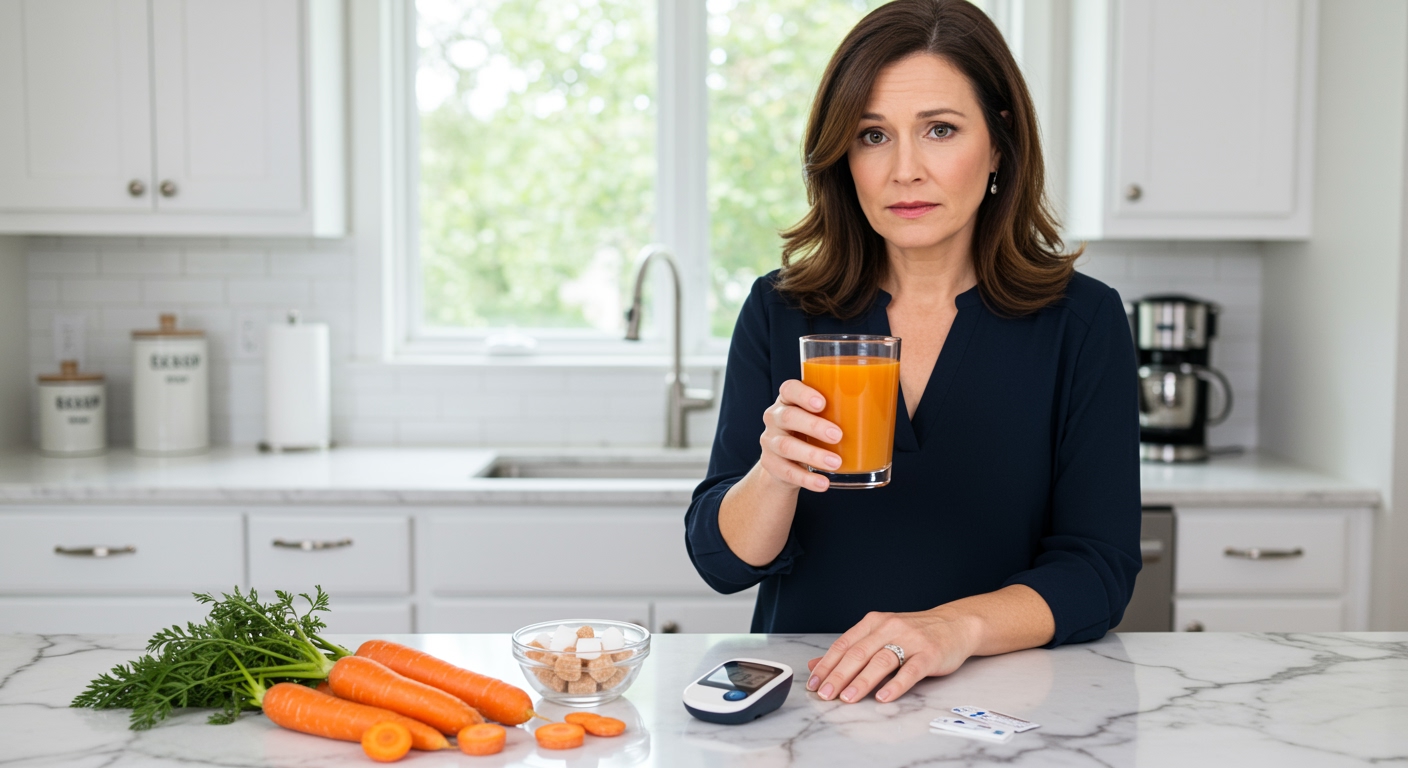✪ Key Takeaway: Carrot juice can spike blood sugar due to concentrated natural sugars and should be consumed in small portions with meals.
Introduction
You grab that glass of fresh carrot juice thinking you made a healthy choice for breakfast.
But your blood sugar monitor tells a different story an hour later when those numbers climb higher than expected.
Hi, I’m Abdur, your nutrition coach and today I’m going to explain exactly how carrot juice affects your diabetes and what you need to know before your next sip.
What Happens When You Drink Carrot Juice?
Your body processes carrot juice very differently than whole carrots.
When you juice carrots, you remove most of the fiber that normally slows down sugar absorption.
This means the natural sugars in carrot juice hit your bloodstream much faster than if you ate the whole vegetable.
One cup of carrot juice contains about 22 grams of carbohydrates and 9 grams of sugar.
Your pancreas responds by releasing insulin to manage this sudden glucose load.
For people with diabetes, this process becomes problematic because your body either cannot produce enough insulin or cannot use it effectively.
✪ Fact: Carrot juice has a glycemic index of 45, which is considered moderate but still concerning for diabetics.
How Does Carrot Juice Compare To Other Juices?
Carrot juice sits in the middle range when compared to other popular juices.
Orange juice contains about 26 grams of carbs per cup, making it slightly higher than carrot juice.
Apple juice packs around 28 grams of carbs per cup, while grape juice can contain up to 36 grams.
However, carrot juice does offer more nutrients than most fruit juices.
It provides high amounts of beta-carotene, which your body converts to vitamin A for eye health and immune function.
The problem remains that all these juices can cause blood sugar spikes when consumed in typical serving sizes.
Your best strategy involves treating any juice as a concentrated source of carbohydrates that requires careful portion control.
✪ Pro Tip: Dilute carrot juice with water to reduce the carb concentration per serving.
What About The Fiber Content?
The juicing process removes most of the beneficial fiber that whole carrots provide.
One medium carrot contains about 2 grams of fiber, but a cup of carrot juice contains less than 1 gram.
This fiber loss matters tremendously for blood sugar control because fiber acts like a natural brake on glucose absorption.
When you eat whole carrots, the fiber creates a gel-like substance in your digestive system that slows down sugar release.
Without this protective fiber barrier, the sugars in carrot juice enter your bloodstream rapidly.
This explains why many people experience better blood sugar control when they choose whole vegetables over their juiced versions.
The fiber also helps you feel satisfied longer, preventing the hunger that often follows juice consumption.
✪ Note: Adding pulp back to your juice can help restore some fiber content and slow sugar absorption.
Can You Include Carrot Juice In Your Diet?
You can include small amounts of carrot juice in your diabetes management plan with proper precautions.
The key involves treating it as a carbohydrate source rather than a free beverage.
Limit your portion to 4 ounces or half a cup at one time to minimize blood sugar impact.
Always consume carrot juice with a meal that contains protein and healthy fats.
These nutrients help slow down the absorption of sugars and create a more gradual rise in blood glucose.
Consider pairing your small serving of carrot juice with foods like nuts, seeds, or lean protein.
Monitor your blood sugar response carefully when you first introduce carrot juice to understand how your body reacts specifically.
✪ Pro Tip: Test your blood sugar 1-2 hours after drinking carrot juice to track your personal response pattern.
What Are Better Alternatives?
Several alternatives provide similar nutrients without the concentrated sugar load of carrot juice.
Whole carrots remain your best option because they provide the same vitamins with natural fiber intact.
Raw carrot sticks make an excellent snack when paired with protein-rich foods like hummus or nut butter.
Vegetable smoothies that include leafy greens with small amounts of carrot can provide nutrients with less sugar impact.
Low-sodium vegetable juice blends often contain less concentrated sugars than single-vegetable juices.
Roasted carrots make a satisfying side dish that allows you to enjoy the flavor while maintaining better blood sugar control.
Water infused with fresh carrot slices provides subtle flavor without any significant carbohydrate content.
✪ Fact: Cooking carrots slightly increases their glycemic index but also enhances beta-carotene absorption.
The Bottom Line
Carrot juice can fit into a diabetes-friendly diet when consumed mindfully in small portions with balanced meals.
Remember that convenience should never compromise your health goals, especially when simple alternatives exist that provide better blood sugar control.
I would love to hear about your experiences with carrot juice and blood sugar management, so please share your thoughts or questions in the comments section below.
References
At NutritionCrown, we use quality and credible sources to ensure our content is accurate and trustworthy. Below are the sources referenced in creating this article:
- Fitterfly: Is Carrot and Beetroot Juice Good for Diabetes
- Tap Health: Is Carrot Juice Good for Diabetes
- Glycemic Index: Carrot Juice Unsweetened Glycemic Index
- Health Match: Juice for Diabetes Type 2





